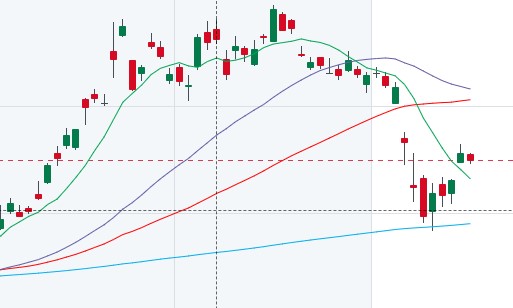Chinese technology and e-commerce giant Alibaba's stock price (NYSE: BABA) has moved firmly into correction territory, down 3.6% through this morning's pre-market, and 23.91% off this highs of just 1 month ago.
This recent turbulence marks a dramatic reversal from the stock's performance over the past year. BABA has delivered impressive returns for shareholders over the past 12 months, with gains of 61.30% a sharp contrast to many in the tech sector. A glance at the 1 year chart below on the daily candles illustrates some of the dramatic peaks and troughs that holders of Alibaba shares will have become accustomed.
From a technical perspective, the recent price action has pushed BABA below its 50-day moving average (red, below), currently sitting around $126. This breach is often viewed as a bearish short-term signal, and was made on 4th April. However, the stock remains above its longer-term 200-day moving average (blue, below) of $97.60 having bounced off the level during the worst of the recent pullback as you can see below.

This technical setup presents a mixed picture: the break below the 50-day suggests weakening momentum, but the position above the 200-day could imply the longer-term uptrend remains intact, albeit tested. The severity of the recent pullback, however, necessitates caution. The purple line represents the 30 day SMA, with green the 8 day.
Growing Competition Presents Challenges
Beyond market mechanics, fundamental concerns regarding Alibaba's core e-commerce business persist. Analysts increasingly highlight the intensifying competitive landscape within China. Aggressive rivals, notably PDD Holdings (parent of Pinduoduo and international platform Temu) and ByteDance’s Douyin (the Chinese version of TikTok), continue to chip away at Alibaba's dominance, gaining market share in critical online retail segments.
Reports suggest Alibaba’s share of China's overall online retail gross merchandise volume (GMV) has been shrinking, a trend that weighs heavily on investor confidence despite Alibaba's continued scale. In an apparent move to counter these pressures and streamline operations, Alibaba recently restructured, consolidating its domestic e-commerce arms (Taobao and Tmall) with its international platforms.
Despite the immediate headwinds and competitive threats, the prevailing sentiment among Wall Street analysts remains largely positive. The consensus rating leans towards “Buy” or “Strong Buy,” with average 12-month price targets suggesting considerable upside potential at $162.41. Analysts often point to Alibaba's relatively attractive Price-to-Earnings (P/E) ratio, ongoing share repurchase programs, and its significant investments in Artificial Intelligence, including its proprietary Qwen large language models, as potential catalysts. The view is not all bullish however, with the bearish target of $85.16 considerably below current price action.
While grappling with intense competition, market share pressures, and macroeconomic volatility, Alibaba continues to retain a strong market position, with significant technological prowess. With the next earnings due in mid May, there will likely be plenty of eyes glued to any news in the build up.
Searching for the Perfect Broker?
Discover our top-recommended brokers for trading or investing in financial markets. Dive in and test their capabilities with complimentary demo accounts today!
- BlackBull 26,000+ Shares, Options, ETFs, Bonds, and other underlying assets – Read our Review
- Admiral Markets More than 4500 stocks & over 200 ETFs available to invest in – Read our Review
- Hargreaves Lansdown The company's website is easily understandable and accessible to a wide range of customers – Read our Review
YOUR CAPITAL IS AT RISK. 76% OF RETAIL CFD ACCOUNTS LOSE MONEY













